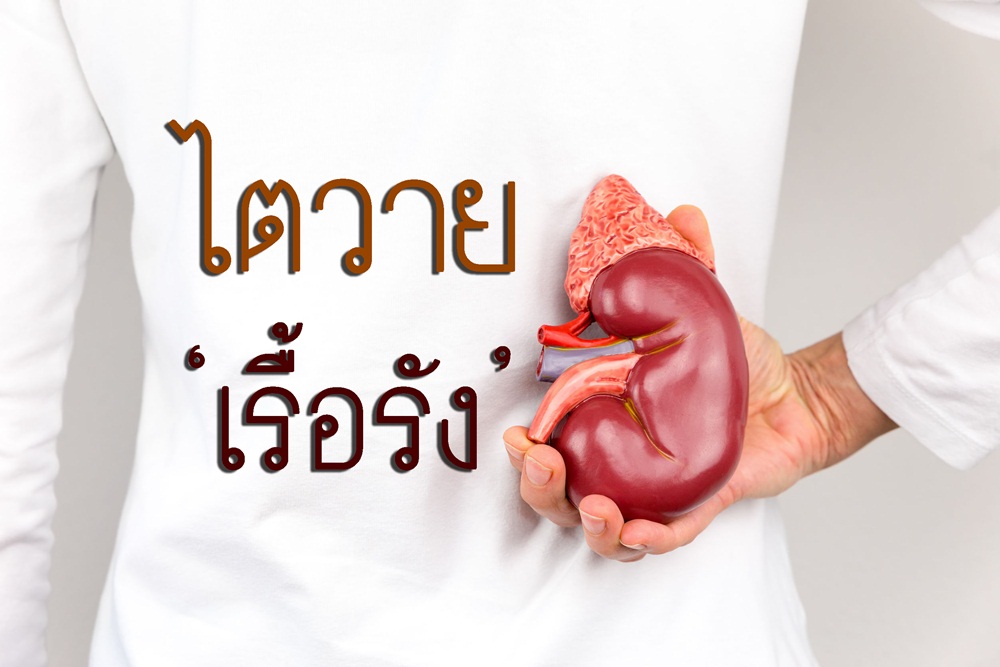
Caring for patients with chronic kidney failure (Part 1)
What causes chronic kidney failure?
Kidney failure is a condition in which the kidneys do not function properly. Normally, the kidneys excrete waste products through the urine. Therefore, kidney failure is A condition in which the kidneys are unable to excrete waste products, including various minerals, through the urine. Those wastes will remain in the bloodstream. Kidney failure is generally divided into two types: acute kidney failure and chronic kidney failure. Acute kidney failure is a condition that occurs quickly. The most common cause is decreased blood flow to the kidneys, such as patients with low blood pressure who have been in shock for a long time or patients who have lost a lot of blood. However, acute kidney failure can be treated to return the kidneys to normal function. Chronic kidney failure is a disease in which the kidney tissue is slowly and continuously destroyed. Until the kidneys are unable to return to work normally.
Common reasons in our country are Diabetes and high blood pressure Such a disease if treated incorrectly high blood sugar levels Blood pressure is not normally controlled. Both of these diseases in the long term can result in chronic kidney failure. As for the second most common condition, Chronic nephritis, kidney stones, or use of certain drugs that have a toxic effect on the kidneys. Especially painkillers We tend to buy our own medicine for long periods of time. As for the symptoms of chronic kidney failure In the early stages, waste products in the blood may not be at high levels. Therefore, in general, there may not be any symptoms at all. They may be detected through an annual health examination. Or a blood test found that waste products in the blood were high. Some people may have abnormal symptoms such as swelling around the face. Eye area or leg area Abnormal urination, such as getting up to urinate frequently at night. As symptoms of chronic kidney failure become more pronounced, symptoms will become more prominent.
If the patient knows that he or she has chronic kidney failure. Early detection and proper treatment are required. It will be able to slow down the deterioration of the kidneys. The best thing to do is that the patient must come see the doctor and strictly follow the doctor’s instructions. What is often found is that patients tend to buy medicine to take on their own. or go for treatment with Chinese medicine, herbal medicine, which factors like this Some medicines have been found to cause kidney function to rapidly deteriorate due to certain ingredients. Therefore, seeing a doctor Follow your doctor’s instructions strictly. It is considered to be the heart of chronic kidney failure care.
Patients with chronic kidney failure What is the treatment method?
Treatment of chronic kidney failure is divided into 3 stages: in the preliminary stage, meaning it is in the first stage; Treatment is mostly medication. Purpose of drug treatment It is not a treatment for returning damaged kidney tissue to a functional state. Medicines that nephrologists give to patients To treat various factors that will cause the kidneys to deteriorate, such as controlling blood pressure. This is a very important factor. If the patient has high blood pressure Controlling blood pressure to a normal level It can slow down the rapid deterioration of the kidneys. Other medications must be considered appropriate for each patient. Therefore, you should follow up with your doctor and not buy medicine to take yourself or take someone else’s medicine. Foods that should be avoided are salty foods and foods with a lot of protein, which will cause waste products in the blood to increase quickly. Today we have many types of treatment. That is often popularly called dialysis. Actually, dialysis is
Currently there are many treatment methods, divided into 2 main types:
- – Kidney dialysis by removing waste products from the blood. By using a solution to put into the abdominal cavity, the principle is to put the dialysis solution into the patient’s abdomen. And waste in the bloodstream will penetrate through the capillary walls. The peritoneal area comes out in the solution. Then change out the waste solution and put the new bag back in. One day it will be done 3 – 4 times and waste can be eliminated. One good thing about this treatment is that The patient may not need to stay in the hospital. In the beginning, you may need to be supervised by a nurse or doctor to make sure you are able to do it yourself. Or some patients are unable to help themselves. It will be a relative who will change the solution, but I would like to emphasize that this method will require a lot of cleanliness. Because if there are germs Or if you don’t wash your hands thoroughly, you will have an infection in your stomach. May be life threatening.
- Hemodialysis using a hemodialysis machine Hemodialysis using a hemodialysis machine Must come to bleach at the factory
For nurses, the principle is similar, which is to remove waste products from the blood. By passing through the filter of the hemodialysis machine. The filter is responsible for filtering out waste products in the blood. Hemodialysis must come 2-3 times a week, once for about 4-5 hours. It can be seen that both methods have advantages. Disadvantages vary. It must be up to the discretion of the nephrologist to advise the patient that Which treatment method is that patient suitable for?


